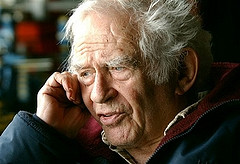Norman Mailer
Friday, November 3rd, 2006The Idiot’s Guide to Norman Mailer
By Patrick Sauer
Listen to an audio story on Mailer’s life and death on NPR.
In 1999, I returned to take New York City by storm after a few years in Los Angeles trying to muster up a screenwriting career. Coming back home prior to winning an Oscar didn’t bother me at all, though, because I had bigger plans than to be a mere movie script hack. I knew Manhattan was where I needed to be to fulfill my destiny to become a writer. I didn’t want to be held back by the simple label of screenwriter, humorist, playwright, novelist, poet or journalist. No, I planned on becoming an amalgamation, an all-of-the-above scribe, authoring masterpieces with no regard to genera, style or the rules of the Man.
In short, I wanted to be Norman Mailer.
 One of the literary lions of New Journalism, Mailer has long marched to the beat of his own muse, conquering fiction (The Naked and the Dead), non-fiction (Armies of the Night, Executioner’s Song), cultural criticism (The White Negro), play writing (Strawhead), screenwriting (contributions to Once Upon A Time in America), directing (of his own novel/script Tough Guys Don’t Dance) and even an essay on the craft of writing itself (The Spooky Art). Oh, along the way he co-founded the Village Voice, ran for mayor of New York City in 1969 on a secession platform to make it the 51st state and has been name-checked by The Simpsons, “Give Peace A Chance” and Charles Bukowski.
One of the literary lions of New Journalism, Mailer has long marched to the beat of his own muse, conquering fiction (The Naked and the Dead), non-fiction (Armies of the Night, Executioner’s Song), cultural criticism (The White Negro), play writing (Strawhead), screenwriting (contributions to Once Upon A Time in America), directing (of his own novel/script Tough Guys Don’t Dance) and even an essay on the craft of writing itself (The Spooky Art). Oh, along the way he co-founded the Village Voice, ran for mayor of New York City in 1969 on a secession platform to make it the 51st state and has been name-checked by The Simpsons, “Give Peace A Chance” and Charles Bukowski.
Yo ho, yo ho, a Mailer’s life for me. (That said, I would refrain from stabbing my wife with a penknife because she would, in turn, kill me.)
With Mailer-esque grandiosity in mind, I decided the first step to success was to begin hob-knobbing with New York City’s intellectual elite. Fortunately, my friend Alex was working for the as-not-yet-officially-announced presidential contender John McCain. He hooked me up with an invite to a cocktail party at Bloomberg News to celebrate the release of McCain’s memoir, Faith of My Fathers. It was a star-studded affair with luminaries sipping champagne and eating shrimp wrapped in bacon as the author signed books and greeted well-wishers. Guests included Charlie Rose, Mike Bloomberg, Secretary of Defense William Cohen, Cindy Adams, Barbara Walters, Carl Bernstein, and Henry Kissinger. I was in my element. I even got a chuckle out of McCain when I stopped MLB player’s union lawyer Donald Fehr from cutting in line by saying, “You cost us the World Series, the line forms back there.”
And then, as I looked about my peers in the room while basking in my future glory, I spotted him.
The Man. The Myth. The Mailer.
Sporting an enormous Band-Aid across his forehead.
This wasn’t one of those white butterfly bandages, or one of the small, rectangular types; it was the classic oval-shaped adhesive your mother slapped on your five-year-old skinned knee after a skateboard crash. I tried to convince myself that Mailer had just come from a bloody-knuckle Christopher Hitchens ass-kicking, but considering he was 76 at the time, the chances seemed slim. Mailer was just an old guy in a rumpled suit with a large Band-Aid covering up some kind of splotch underneath his thinning white hair.
So, he looked a bit silly. What did I care? This was my opportunity to kickstart my quest to become the 21st century Norman Mailer by taking mental notes from the 20th century version. I walked over and somewhat sheepishly introduced myself. One never knows how they will act in the presence of greatness.
“Hello, umm, Mr. Mailer. I’m a writer and I just wanted to say that I am a big fan of your—”
“What’s your name?”
“Patrick Sauer.”
“How do you spell that?”
“S-A-U-E-R.”
Mailer mulled that over for a few long seconds while I tried to think of something intelligent and witty to say, the kind of remark that would get me invited to dinner parties in Provincetown. Before I came up with anything, Mailer interjected.
“You’re a writer, huh? Have you written anything I might be familiar with?”
In my mind, the writer’s life I was envisioning for myself went down in a fiery crash like John McCain’s A-4 Skyhawk. Not only did I not have a single worthwhile credit to offer the multiple-Pulitzer-prize-winning-writer standing in front of me, but I also couldn’t look this living legend in the eye because the peculiar, unexpected Band-Aid hypnotized me.
So, I half-mumbled a response.
“Are you familiar with the Complete Idiot’s Guides series?”
“No.”
“Umm, well, they’re mass-market reference books, but, umm, you know…I’m just getting started and well…anyhow, I just wanted to say it’s an honor to meet you.”
Mailer gave me the smile of a pugnacious grandfather.
“Well, Patrick Sauer, I’ll look out for that name. Who knows? Maybe I’ll be writing for you one of these days.”
He shook my hand. And then he wandered off to the party.
Norman Mailer photo from Flickr user Gifted Gourmet.




